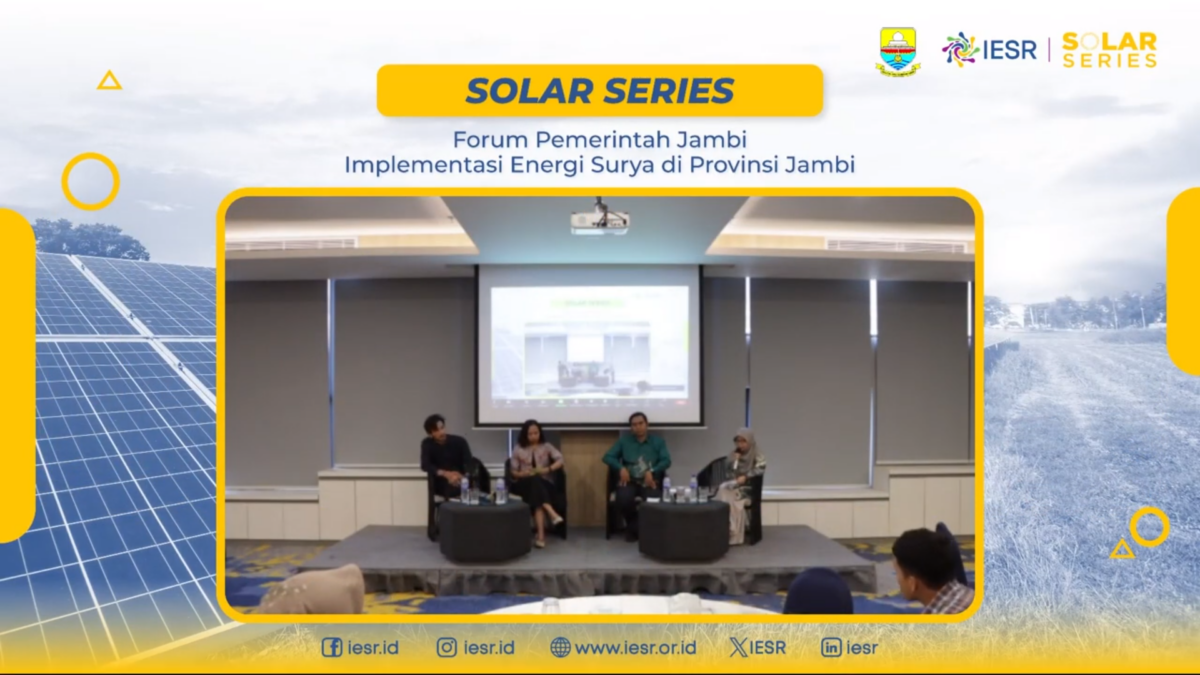Jambi, 28 November 2023 – In the General National Energy Plan (RUEN) document, Indonesia targets 23% renewable energy mix by 2025. Until 2023, Indonesia has only achieved 12.5% renewable energy in its energy mix. In the Jambi Government Forum organized by the Institute for Essential Services Reform (IESR) in collaboration with the Jambi Province Energy and Mineral Resources Office (ESDM) (28/11), Yunus Saefulhak, Head of the Energy Policy and Hearing Facilitation Bureau stated that the National Energy Council (DEN) predicts that in 2025 Indonesia will only reach 17-19 percent of renewable energy in the national energy mix.
“The province’s role in pursuing predetermined renewable energy targets is important, in accordance with the potential in each region,” said Yunus.
Yunus added that Jambi does have quite a lot of fossil resources, but it can still seize various opportunities to develop renewable energy, such as the use of rooftop PV on government buildings.
Anjas Bandarso, Energy Policy Analyst from the Directorate General of Regional Development, Ministry of Home Affairs, in the same forum highlighted the limited authority of regional governments for energy matters.
“Whatever the sub-national government does, as long as there is no authority given to the regional government, it will just be a story. So the central government is looking for ways in which regions can develop new, renewable energy. “This can be realized with Presidential Decree 11/2023 concerning additional concurrent authority for regional governments,” said Anjas.
Nanang Kristanto, Sub-Coordinator for RUEN Implementation Monitoring, National Energy Council, added that whatever target is the government’s priority, whether for Net Zero Emission (NZE) or achieving renewable energy mix figures, local governments have an important role.
“Regional governments have an important role in pushing the energy transition agenda by maximizing energy transition derivative activities in their regions, funding support, preparing human resources to maintain decentralized generating installations, as well as socializing new renewable energy in districts and even sub-districts,” said Nanang.
Apart from having natural products such as oil palm plantations and coal producers, Jambi also has large renewable energy potential. Jambi Province is targeting a renewable energy mix of 24% by 2025, and this target is optimistic that it will be achieved because currently the Merangin-Kerinci hydroelectric power plant with a capacity of 350 MW is being built.
Jambi also has quite large solar energy potential, reaching 281.5 GW based on land suitability. Marlistya Citraningrum, Sustainable Energy Access Program Manager, IESR stated that solar energy could be an option that allows various parties to contribute to the availability of clean electricity.
“Installing rooftop PVs has a number of benefits, such as being a means of mutual cooperation in achieving energy mix targets and reducing emissions, providing clean electricity sources in various regions, opening up business/employment opportunities for local residents, as well as increasing the competitiveness of the solar industry/business in Indonesia,” he said.
Marlistya added that the public wants incentives for rooftop PVs users, which could be in the form of ease of licensing, or facilitation of financing by the government.

